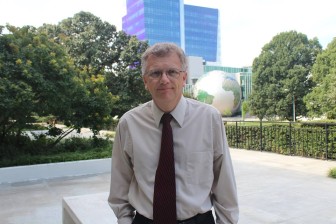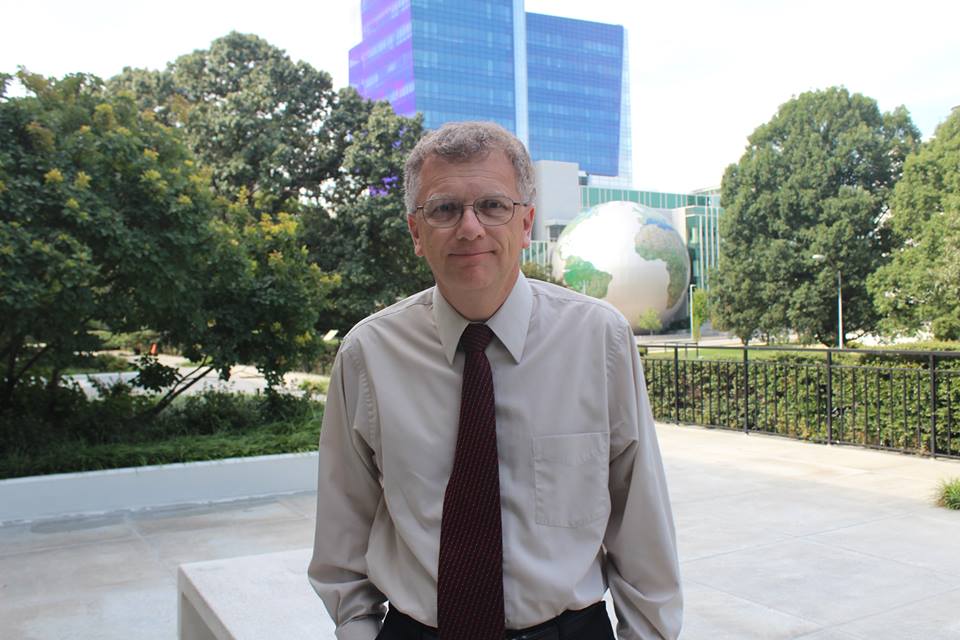This is the second in our newest interview series, On The Record. This week, we sat down with District B Councilor David Cox to discuss development, density, and his love of biking around the City of Oaks.

David Cox
Neighborhood advocate turned City Councilor David Cox hadn’t entirely made up his mind about running when he filed his paperwork with the Board of Elections last July.
“Honestly when I went down to file, I had made the decision to do that the day before, and then I went down there and I got to thinking, OK, well, I’ll file, then think about it for a week because I can always back out of it,” Cox said.
The next day, former News & Observer reporter Mechelle Hankerson, who had been on hand when Cox filed, broke the story of his candidacy.
“As soon as it hit the paper that I had filed, people were sending me money,” he said.
“People start giving you money, you take their check and put it in the bank and you think, ‘This is a real thing now, how do I back out?'”
One of the main reasons he wanted to run, Cox said, was he felt those same neighbors who would go on to finance his candidacy were not having their voices heard at Council.
“It became an issue about pure and simple representation: having someone on Council that’s going to represent the interests of the people who vote,” he said.
Cox believes his primary role on Council is to listen to and look out for the best interests of the people who helped put him there.
“With the money they’ve given me and the help they’ve given me; the only thing I can do is be a good steward.”
Campaign finance records show nearly all of Cox’ contributions came from small donors, many of them his direct neighbors. Emblematic of the grass roots nature of his campaign was a listing in one report of the following in-kind donations: a $20.38 vegetable tray, a $53.92 plate of cookies and $30 worth of cream puffs.
“I don’t like asking people for money,” Cox said of his fundraising efforts.
“Especially when I’m promoting myself.”
Responsible Development
While Cox made a name for himself by leading the charge against a proposed shopping center in his neighborhood, he doesn’t consider himself anti-development.
“I’m not just going to sit on Council and say ‘no’ to every rezoning request that comes along,” Cox said.
“I want to make sure people that live in the area understand what a proposal is all about, that they identify their specific concerns and give the developer a chance to respond to those concerns.”
Nor, Cox said, does he want to force a development on a community that doesn’t want or need one.
If an area is zoned low-density residential and is mostly made up of surrounding single-family homes, someone requesting to put an apartment complex in may not be successful under his watch, he said.
“Unless the neighbors are comfortable with what the developer is proposing, I would have a pretty difficult time supporting a proposal like that. If the developer is willing to come in and put in adequate buffers and address the other concerns of neighbors, I can see a development going ahead,” Cox said.
“But really, the onus, if you will, is on the developer to work with the surrounding neighbors. When they come in and propose a rezoning, what they’re proposing is changing the law, and there has to be a compelling reason for doing so.”
While Cox acknowledged a need for the city to allow for denser development in certain regions to accommodate an ever-growing population, he thinks there’s better approaches than simply building a slew of new apartment complexes.
“Here’s something that I think we’re missing— we’ve created all these districts, mixed-use districts: neighborhood mixed-use, community mixed, conditional mixed-use: what’s being lost in all of this is the ‘mixed-use’ component,” Cox said.
“Let’s build an actual mix of uses so we have town homes, single-family homes and apartments, that’s why I like where I live: we have that mix.”
“It’s not like where, you go into some parts of town and block after block after block it’s one apartment complex after another: I don’t think that’s what we should strive for in a city.”
Around Raleigh On a Bike
Cox was born in Northwestern Pennsylvania and moved to Rochester, New York after college, where he lived before moving to Raleigh with his wife Helen in 2001.
“One of the things we did when we moved here, and what we’ve done regularly over the years, is we just park our cars and ride our bikes through an area to see what it’s like.”
This was how Cox came across the Falls Lake community in North Raleigh he now calls home.
“When we first moved here [in 2001] we found a house behind the Raleigh Grand movie theater,” Cox said.
“It was a nice neighborhood and we enjoyed the neighbors, but it lacked sidewalks: it was not what I’d call a walkable area.”
After seven years, Cox said they decided to seek out a neighborhood that was more like a small town than a traditionally suburban neighborhood.
“So we’re riding down Dunn Road, and we see this big sign they have up that said ‘Featuring 26 miles of sidewalks’ — that was a big plus for us,” he said.
When it comes to increasing walkability citywide, Cox said he fully supports building sidewalks “as much as we can afford to.”
“We have a long waiting list of neighborhoods that have requested them, and so if it’s possible as Raleigh continues to grow as we continue to increase our revenues each year, it would be nice if we can use some of that money to help speed up the implementation of sidewalks.”
As an avid cyclist, Cox wants to ensure the City works to improve bicycle as well as pedestrian infrastructure, one of the reasons he voted in support of a recent decision to implement a bike share program.
“I know it’s an expensive proposition; I’m optimistic that we will get the sponsorships to help reduce the ongoing costs; it’s one of those things that unless you step up and do it, it’s hard to know if it will work,” he said.
“But I’m optimistic it’ll be popular and prove useful.”
Citizen Engagement
As a way of keeping those neighbors he now represents involved with their community and the issues affecting them, Cox said he created a Facebook group for his Council district.
“I’m very proud of that, but honestly it’s still less than 300 people that belong to that group, and I would like to get more people involved.”
One of the few things that’s surprised him since getting elected, Cox said, is the sheer volume of organizations and events within the city.
“I get invitations to so many events, and as someone that works full time, you know, I have evenings and weekends sometimes, so it’s difficult to go everywhere,” he said.
“I cannot say I’ve had single week [since the election] where I’ve had the entire week to myself; I’m lucky if I get one or two evenings. I’m still trying to work out a night to go with my wife to see ‘The Jungle Book!'”
Despite the significant time commitment, Cox, who completed his Ph.D. in Computer Science in 2010,” said Council still leaves him with more time than when he was working full-time and taking 90 minute classes twice a week.
“With Council it’s two afternoons a month, and many times we don’t take up the entire afternoon, so then I go back work until maybe six or seven,” Cox said.
Often times, he said, his work on Council isn’t that different from his work as a software engineer.
“I find that interesting about the ‘ands’ and ‘ors’ [in the zoning code] because we use that all the time with logic and computers. So looking at the law, it’s interesting, they also call it code, and we call it code, and in a way, it’s kind of like debugging software.”
For the detail-oriented Cox, this aspect of the job is a feature; not a bug. So far, he said, he’s really enjoyed his time on Council, a role he’d like to continue into the future.
“I think I would stick around, as long as people think I’m doing an OK job, but we’ll see what happens,” Cox said.
